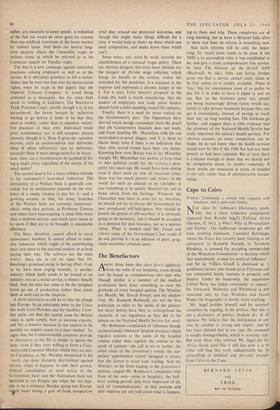The Benefactors
AMONG those busts that stare down sightlessly from the walls of our hospitals, room should now be found to commemorate two men who (though neither is a member of the medical profession) have done something to earn the gratitude of every hospital patient. The Minister for Health, Mr. Enoch Powell, and his shadow rival, Mr. Kenneth Robins* are not the first politicians to refer to the needs of the patient; but never before have they so monopolised the attention of our legislators as they did in the debate on the National Health Service last week. Mr. Robinson complained of 'inhuman though unintentionally inhuman' hospital practices which regulate patients to the needs of the hospital routine rather than regulate the routine to the needs of patients—the call at six or earlier; the awed ritual of the consultant's round; the out- patient 'appointment system' designed to ensure that the doctor is never kept waiting. And the Minister, so far from leaping to the profession's defence, capped Mr. Robinson's complaints with three of his own—noise in hospitals; the half- hour visiting period; and, most important of all, lack of 'communications,' so that patients and their relatives are not told about what is happen- ing to them and why. These complaints are of long standing, but to have a Minister fully alive to them and bent on reform is something new.
And such reforms will be only the begin- ning; for much more needs to be done if the NHS is to accomplish what it was established to do, and give a really comprehensive free service. In their The Genesis of the British NliS (Blackwell, 6s 6d.), John and Sylvia Jewkes point out that a service cannot. really claim to be free unless its is readily available. Water is 'free,' but for convenience most of us prefer to pay for it in order to have it piped in and on tap. But, as the Jewkeses point out, people are being increasingly driven (some would say, lured) to take private treatment because they can get it immediately, instead of having to work their way up long waiting lists. The Jewkeses go further, and suggest there is little evidence that the existence of the National Health Service has really improved the nation's health services. For obvious reasons, no exact comparison can be made; we do not know what the health services would now be like if the 1948 Act had not been passed, or had been repealed. But at least there is evidence enough-to show that we should not be complacent about its results—especially if those results are measured in terms of benefits to the sick, rather than of administrative stream- lining.


















































 Previous page
Previous page